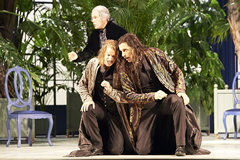| Opera Reviews | 3 May 2024 |
A musically uneven Cosìby Moore Parker |
|
| Mozart: Così fan tutte Salzburg Festival 31 August 2013 |
|
|
The protagonists stem in part (Fiordiligi and Despina) from the Zurich version (also Bechtolf and his stage designer, Rolf Glittenberg), and together with the Salzburg newcomers have clearly been well drilled in character definition and interaction - resulting in well-contrasting and dramatically credible (if totally conventional) figures. Act One is set in a generously proportioned conservatoire filled with tropical foliage, with the action focussed around a centrally placed pool. (Fiordiligi and Dorabella's nude doubles bathe during the overture, the two sisters sail model boats during "Soave sia il vento" and Despina and Alfonso later share the water to cool their tired feet). Act Two takes us to the indoor perspective with a dining table and floor-length cloth replacing the pool and providing camouflage for the protagonists when required. There are few surprises (perhaps fortunately), and probably the most innovative stroke in the concept is Alfonso's unwitting suicide when, in the finale, he drinks his own poisonous potion (from a glass Guglielmo had intended for his own use) - and thus becomes the ironic victim of his guile. Franz Welser-Möst who conducted the trilogy in Switzerland withdrew from the Salzburg performances, to be replaced by Christoph Eschenbach. And while the visual side of this final summer opera production in this Salzburg season may be justly criticised for lack of originality, the greater issue really lies in the casting and musical dimension of the interpretation. The Vienna Philharmonic Orchestra maintains a standard of accuracy throughout - but in a reading uninspired under Eschenbach's baton. Often plump, inelegant, and at times on knife-edge risk in coordination with the stage, this is hardly a definitive reading. With the possible exception of Luca Pisaroni (Guglielmo) no member of the cast can compete with (let alone eclipse) memories of other recent interpreters. Gerald Finley (Alfonso) and Martina Jankova (Despina) are awarded the bouquets from the house - but are as much advantaged here by their colourful roles and certain colleagues' deficiencies, as by the stature of their artistic achievement. Finley is vocally and dramatically satisfying in his nicely-rounded portrayal, but dims in comparison (for example) to Walter Berry or Sir Thomas Allen, who most recently performed the role here in 2006. Jankova is an uninhibited and lively Despina (though disappointing as the Notary) who injects energy and humour into the proceedings - while failing at times in volume and (surprisingly for a light lyric soprano) in her upper register. Malin Hartelius cuts an attractive figure, acting with charm and ease, but lacks the sheer vocal dimension to make this Fiordiligi a winner. While "Per pieta" fared better than "Come Scoglio", neither showpiece scaled wished-for pinnacles - and the overall reading was indeed marred by precarious moments in which the occasional threadbare note and intonation issues pointed to a certain vocal distress. Her sister in crime, Marie-Claude Chappuis is most erratic in her vocalising. The occasional optimistic phrase is marred by an uneven line, wayward pitch and corresponding unease (at least for this listener). She does, however, present a pretty stage figure who performs with confidence and obvious verve. Given time, Martin Mitterrutzner may develop into a Ferrando - indeed, perhaps one of stature. At present the role is at least one number too large - both for the house and the event. His vocal production is generally well-balanced, flexible and accurate, but the vocal weight and timbre are simply too meager for the task. The ensemble moments worked reasonably with his colleagues, the testingly exposed "Un aura amorosa" less so. And so to Luca Pisaroni, whose Guglielmo gave one the thrill of true Festival status. Generous in dimension and in possession of all the necessary criteria for the role, here was the show stealer of the production. The da Ponte sequel in 2014 will be of interest. |
|
| Text ©
Moore Parker Photo © Michael Pöhn |

 The
opening performance on August 21 of this Sven-Eric Bechtolf production
found few fans among critics and audience alike. Now, in this fifth
and closing matinée, it would appear that the run has brought
little or no amelioration since the opening night.
The
opening performance on August 21 of this Sven-Eric Bechtolf production
found few fans among critics and audience alike. Now, in this fifth
and closing matinée, it would appear that the run has brought
little or no amelioration since the opening night. 





